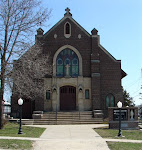Conservative and patriotic American Catholics need not feel ashamed of loving their country and wanting to protect and preserve her institutions and culture. A response to Lisa Fabrizio.
While I agree with much of what Lisa Fabrizio wrote in her article (The Catholic Case for Immigration Reform), I felt the need to clarify a few points about Catholics and immigration policy (with which I'm inclined to feel she would generally agree) lest non-Catholic readers get the wrong impression about the Church and Her teaching and thus join the ranks of Bishop Sheen's misinformed Catholic -haters (those who profess to hate the Catholic Church, while actually opposing a straw-man caricature of Her painted by critics).The U.S. Conference of Catholic Bishops has, while recognizing the need to strengthen the border to reduce further illegal immigration, endorsed what it calls "broad-based legalization" for those undocumented immigrants who can "demonstrate good moral character and have built up equities in this country." Ms. Fabrizio agrees with this stance which runs counter to those of many conservative American Catholics, including me.
Conservative and patriotic American Catholics need not feel ashamed of loving their country and wanting to protect and preserve her institutions and culture. This is neither racist nor nationalistic. It is entirely proper. In his book Memory and Identity, the late Holy Father Pope John Paul II referred to patriotism as "a love for everything to do with our native land: its history, its traditions, its language, and its natural features." Concomitant with that love of country goes a desire to protect and preserve it as the Church Herself protects, preserves, and hands on the Deposit of Faith. Theologically speaking, he described a healthy patriotism as an example of fidelity to the Fourth Commandment of the Decalogue "which obliges us to honor our father and mother." Clearly American Catholics can express their patriotism by opposing amnesty consistent with magisterial teaching.
The Church's Magisterium is a very specific thing: it is the Holy Father, St. Peter's successor, speaking under the guidance of the Holy Spirit and in conjunction with the Bishops, the Apostles successors, only on matters of faith and morals. There is a specific process under which these statements are made. These pronouncements are ever unchanging and enjoy the stamp, by the Grace of God, of papal infallibility. On the other hand a press release issued by the U.S. Conference of Catholic Bishops on a political matter such as immigration policy is, while given great weight by the faithful, in the end a mere matter of personal opinion, not a pronouncement of the Magisterium, and thus it is not incumbent upon lay Catholics to agree.
An example of this difference can be seen in the Church's teaching on the life issue: the intentional killing of innocent human life (such as abortion) has always been condemned by the Church as a grave, intrinsic evil and must be seen as such by the Catholic faithful. The death penalty, on the other hand, is seen by the Church's Magesterium as a legitimate tool of the state to dispense justice, even though the last two Popes have been personally opposed to it on practical grounds. Neither John Paul II nor Benedict XVI have ever attempted to (nor could they) ...
For the rest of the article click here: Intellectual Conservative




